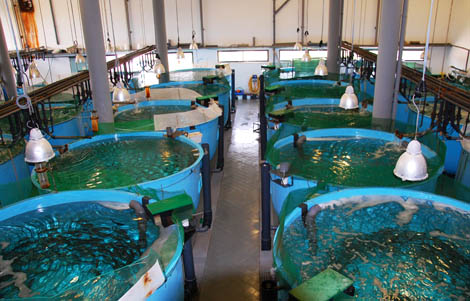 A consortium led by the Algarve company Sparos, which integrates the Universities of the Algarve and Trás-os-Montes and Alto Douro (UTAD) and other institutions, is promoting the ALISSA project – “Bases for healthy and sustainable food for aquaculture fish ”.
A consortium led by the Algarve company Sparos, which integrates the Universities of the Algarve and Trás-os-Montes and Alto Douro (UTAD) and other institutions, is promoting the ALISSA project – “Bases for healthy and sustainable food for aquaculture fish ”.
This project intends to contribute with new knowledge and practical tools for a healthier and more sustainable diet for aquaculture fish.
“We want to respond to the challenges that Portuguese and European aquaculture face in terms of external competition and the demands of their consumers in terms of quality, environmental standards and competitive prices”, says Paulo Rema, researcher at UTAD and a specialist in aquaculture.
Feeding is one of the main costs of a fish farm (20-50% of the operational cost). Therefore, the strategies associated with the supply of food "must comply with strict parameters that allow for optimized nutrition, optimal growth and health status of the fish, always with minimal environmental impact", explains Luís Conceição, one of the heads of the company Sparos, leader in the field of fish nutrition.
The ALISSA project thus contributes to the development of new foods, based on sustainable and safe ingredients, which “promote the growth and immune condition of fish, within parameters of economic and environmental sustainability”.
A new range of fish feed supplements will allow for significant fortification of foods currently used in immunostimulants (eg amino acids) which, supplied via the alimentary pathway, will “make fish more resistant to disease and management”.
According to the researcher from UTAD, the results of this project will be an "important tool for this area of animal production and may also contribute to a change in consumer mentality in relation to aquaculture fish".
This multidisciplinary project also includes the company A. Coelho e Castro Lda, the University of Algarve/CCMAR (UALG); the Abel Salazar Institute of Biomedical Sciences of the University of Porto/CIIMAR (ICBAS), the Molecular and Cell Biology Institute (IBMC) and the University of Aveiro/CESAM.
The R&DT project under co-promotion is co-financed by the European Regional Development Fund (ERDF), through COMPETE 2020 – Competitiveness and Internationalization Operational Program (POCI), and has a total financial allocation of about 1,2 million euros, having been approved in November 2015 for a period of three years.


















Comments